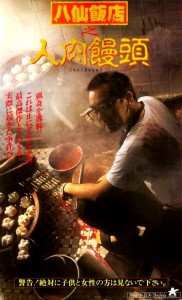
“The Untold Story” Japanese Theatrical Poster
Director: Herman Yau
Cast: Anthony Wong, Danny Lee, Emily Kwan, Lau Siu-Ming, Shing Fui-On, Parkman Wong Pak-Man, Yee Ka-Fat, Lam King-Kong, Julie Lee, Leung Hung-Wah
Running Time: 96 min.
By Martin Sandison
One of the most notorious Category 3 Hong Kong films ever made, Bunman (what a title!) features everything that makes extreme HK cinema so unique: brutality, seriously dark comedy and insane energy that spills off the screen. Only in Hong Kong in the 90’s would an actor as great as Anthony Wong star in such a disturbing film, and then win the Hong Kong film award for best actor for it! At the time Wong was making a name for himself, having appeared in amongst numerous others Ringo Lam’s bizarrely demented and uber stylish Full Contact and John Woo’s utter masterclass in action (and my favourite movie) Hard Boiled. 1993 was a very busy year for Wong, with his stand out roles in The Heroic Trio and another Category 3 thriller Taxi Hunter (also directed by Herman Yau) – only the tip of the iceberg.
Bunman gained a reputation for being nihilistic yet darkly comic, and it’s a testament to the idea and Wong’s performance that the film rises above its exploitative base to deliver a serious message about the nature of man and the realities of modern society. The very premise – purportedly based on a true story – is profoundly sick but humorous like the rest of the film. Wong plays Wong Chi-Hang, a restaurant owner who has inherited it from a gambling friend. As body parts start to pile up on the beach and Wong’s behaviour becomes increasingly psychotic, the police start to move in.
The film manages to maintain an edgy, dark atmosphere that is punctuated by silly comedy (what more would you expect of a 90’s HK film?) and Yau must be given credit for this. Without Wong’s performance the film would suffer however, and what a towering one it is. Wong constantly looks like a real psychotic throughout, a real nasty piece of work. Later in the film I grew to feel sorry for him though, despite his despicable actions. He gives shades of humanity to a real monster of a human being, deserving all the accolades he received. Subsequent Wong performances in everything from Category 3 shockers like Ebola Syndrome or gangster flicks like Johnnie To’s Exiled have proven his range, but none come close to the intensity on show in Bunman.
The film is produced by and co-starring Danny Lee, that legend of HK cinema. The previous year he had directed another Category 3 classic Dr. Lamb, the subject matter of which is similar to Bunman. Other than these two instantly recognisable faces, most of the cast are second or third tier HK actors. Emily Kwan Bo Wai features as Bo, the female officer who is the butt of most of the (sexist) jokes. She appeared in Dr. Lamb and Ringo Lam’s Full Alert among others. Lau Siu Ming has a small part as Cheng Lam, the friend of Wong’s who suffers greatly in his only scene. He is a veteran HK bit part actor, having been in Tsui Hark’s new wave fantasy extravaganza Butterfly Murders and Corey Yuen’s pure 80’s actioner (and the first HK film I ever bought on VHS) Righting Wrongs. Shing Fui On (Big Sillyhead to his fans) has a very small part as Lau’s brother, making Wong’s short spell in prison pretty horrible.
The catalogue of horrors that are depicted in the film are seriously twisted, and test even the strongest stomach. The worst of them comes midway through, with the murder of Cheng Lam and his family (including his three very young daughters). This scene is up there with the most harrowing moments of all cinema. Other ones feature Wong’s torture by the police – wherein a nurse who Wong had previously tried to use as a hostage injects him with water that creates blisters all over his skin – and his suicide attempt that culminates in him biting the artery on his wrist.
Despite not being for everyone, Bunman is a very engaging and intense film that anyone with a penchant for extreme cinema must check out. Obvious faults are the lack of a consistent style and the limitations of a low budget, but these can be overlooked. After watching Wong take on the role with so much gusto, I would be slightly worried if I met him! By all accounts he is one seriously cool and relaxed guy in person, giving credence to his unbelievable depiction of Wong Chi-Hang.
Martin Sandison’s Rating: 8/10
By Numskull
“We seem to be the only species who truly goes crazy without benefit of disease or a sharp blow to the head.” -Jessica Horsting, MIDNIGHT GRAFFITI (copyright 1992, Warner Books)
“Masterpiece” is not a word that I throw around lightly. Pardon me for saying so, but there are certain “critics” on the net who dole out perfect ratings way too easily. It’s feast or famine with some people; either a movie is “flawless,” “perfect,” and “tied with (72 other films) for Greatest Movie Ever Made,” OR, it’s “worthless,” “dog shit,” and “enjoyable only by those with I.Q.s of lower numerical value than their shoe sizes.” No middle ground? Bollocks.
If you ask me, there’s no such thing as a perfect movie, but there are a select few that are so impressive that I can forgive their shortcomings unconditionally. Like what? There’s BRAINDEAD (Yours Truly’s all-time favorite flick), POLICE STORY (Jackie Chan has yet to top it and probably never will), SEVEN (yeah, that’s right, a Hollywood movie…you got a problem with that?!?), and now, THE UNTOLD STORY (which, by the way, is only the second film I’ve ever reviewed on this site and given a 10/10 rating).
How about music? Can you think of any albums (do they still make those? I guess I should just say “CDs”) where you can listen to the whole thing through and not be even remotely tempted to skip a song or fast forward through a small part of one? I can…VEREHRT UND ANGESPIEN by In Extremo, and Kreator’s brilliant ENDORAMA (which, by the way, includes “Chosen Few,” a song I am going to insist, come Hell or waters high, be played at my wedding reception, in the unlikely event that I ever have one). Not even Skyclad…the greatest band ever to walk the Earth…has such a CD in their discography (which, by the way, has been growing steadily since 1991).
Books (you know, those things with words in them)? Well, the “masterpieces” I had to read in school bored the living shit out of me, and served as a solid basis for my theory that English teachers want to turn kids off of literature in general to prevent them from wanting to become English teachers themselves, thus ensuring their own job security via lack of competition (except for Alexander, of course). So what would I happily slap the “M” word on? Definitely TITUS GROAN and GORMENGHAST by Mervyn Peake, and maybe SURVIVOR (which, by the way, has nothing to do with that crappy TV show) by Chuck Palahniuk, author of FIGHT CLUB (which, by the way, has a much cooler ending than the movie).
Now that I’ve lost about 70% of my audience by talking about books and the other 30% by shamelessly plugging stuff, I can get on with THE UNTOLD STORY. It’s a deliberately nasty, brutal film based on a tragic, real-life story (which, by the way, means it is no longer “untold”). How accurately the events are presented…how much fiction is mixed in with the facts…I do not know. Perhaps it doesn’t even matter, because there’s so much senseless violence in the real world anyway; the movie painfully drives home the reminder that all sorts of terrible things can happen to anyone at anytime…especially at the hands of another human being.
Anthony Wong is brilliant as the psychotic Wong Chi Hang. He strikes a perfect balance between ultra-violent dementia and false normalcy. The most dangerous sort of lunatic is the one who gives an outward appearance of being a mentally stable, unremarkable (if a little obnoxious, in Wong’s case) member of society, letting their insanity out to play only when it is safe to do so (or when they’re going to kill all the witnesses…). That’s what you can expect to see in this movie. A lesser actor probably would have played the role like an obscene Saturday morning cartoon super-villain, mindlessly slobbering over child pornography and laughing hysterically while beating people to death in public. Wong resists the temptation to play a Satanic Jim Carrey on crack and instead gives us a thoroughly impressive and utterly plausible performance. Small wonder he won the 1993 Hong Kong Best Actor award for it.
Meanwhile, Danny Lee plays a cop for about the 847th time. He regularly picks up prostitutes (or at least loose women) and he bosses around a few men who alternately try to please him, try to score with his chicks, and needle their female colleague about her lack of ladylike characteristics. They get slapped a lot. The darkly comic aspects of The Untold Story revolve around these decidedly UN-Supercops; witness their childish “Eww, gross” reaction to the human body parts that wash up on a beach at the beginning of the movie.
Too much has been made of the whole “people getting chopped up and fed to restaurant patrons in the form of meat buns” business (which, by the way, is somewhat perpetuated by the restaurant-style DVD menus…nice touch). Yeah, it happens, but to say that that’s what the movie is “about” would be doing it a great disservice.
There can be no argument that the Category III rating is warranted. Little is held back in terms of raw brutality. Two scenes in particular stand out for being shockingly explicit. I don’t want to give too much away; you’ll know which scenes I’m talking about when you see them. After reading EXQUISITE CORPSE by Poppy Z. Brite and AMERICAN PSYCHO by Bret Easton Ellis (which, by the way, is so gruesome it makes the movie look like a Disney cartoon by comparison), you can handle pretty much anything, so I wasn’t bothered too deeply. YOU might be. And I wouldn’t blame you. Watching women get raped and children get butchered ain’t for everyone. Remember, though: stuff like this happens to somebody, somewhere, every single day.
The script is very well-done. It would have been easy to throw together a cheesy teen slasher flick-type flow of events where Wong remains on the loose until the very end, when the last fine officer of the law finally brings him down. Mercifully, a much more realistic and satisfying road gets taken. I find it a little hard to believe that the cops would have found the evidence in the garbage truck THAT quickly (and in the dark, no less), but, when my first and foremost quibble is something as minor as that, I’m perfectly willing to look the other way.
I’ll definitely be checking out the other Herman Yau/Anthony Wong collaborations, such as TAXI HUNTER and NEW TENANT (which, by the way…oh, shit, I haven’t seen it yet so I guess I’ve got nothing to add here). I’ll be one deliriously happy camper if I enjoy them half as much as I enjoyed The Untold Story.
Which, by the way, was one hell of a lot.
Numskull’s Rating: 10/10


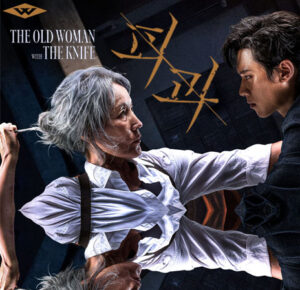
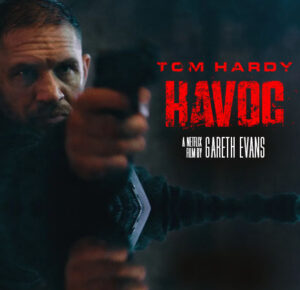
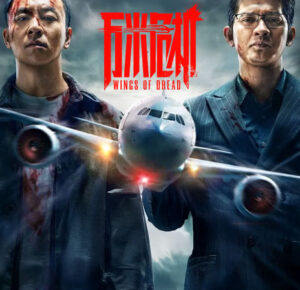




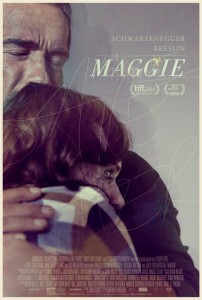












1 Comment